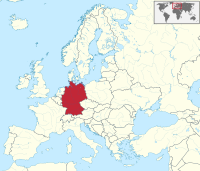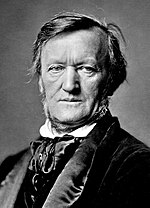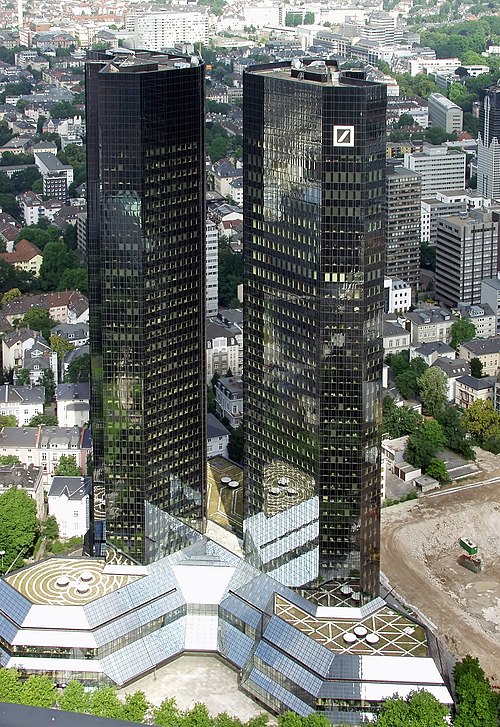Portal:Germany
Welcome to the Germany Portal!
Willkommen im Deutschland-Portal!

|

|

| |
Germany (German: Deutschland), officially the Federal Republic of Germany, is a country in Central and Western Europe, lying between the Baltic and North Sea to the north and the Alps to the south. It borders Denmark to the north, Poland and the Czech Republic to the east, Austria and Switzerland to the south, France to the southwest, and Luxembourg, Belgium and the Netherlands to the west.
Germany includes 16 constituent states, covers an area of 357,578 square kilometres (138,062 sq mi) and has a largely temperate seasonal climate. With nearly 83 million inhabitants, it is the second most populous state of Europe after Russia, the most populous state lying entirely in Europe, as well as the most populous member state of the European Union. Germany is a very decentralized country. Its capital and largest metropolis is Berlin, while Frankfurt serves as its financial capital and has the country's busiest airport.
In 1871, Germany became a nation-state when most of the German states unified into the Prussian-dominated German Empire. After World War I and the Revolution of 1918–19, the empire was replaced by the parliamentary Weimar Republic. The Nazi seizure of power in 1933 led to World War II, and the Holocaust. After the end of World War II in Europe and a period of Allied occupation, two new German states were founded: West Germany, formed from the American, British, and French occupation zones, and East Germany, formed from the western part of the Soviet occupation zone, reduced by the newly established Oder-Neisse line. Following the Revolutions of 1989 that ended communist rule in Central and Eastern Europe, the country was reunified on 3 October 1990.
Today, Germany is a federal parliamentary republic led by a chancellor. It is a great power with a strong economy. The Federal Republic of Germany was a founding member of the European Economic Community in 1957 and the European Union in 1993. Read more...
Selected article

Richard Wagner (22 May 1813 – 13 February 1883) was a German composer, theatre director, polemicist, and conductor who is primarily known for his operas (or, as some of his later works were later known, "music dramas"). Unlike most opera composers, Wagner wrote both the libretto and the music for each of his stage works. Initially establishing his reputation as a composer of works in the romantic vein of Weber and Meyerbeer, Wagner revolutionised opera through his concept of the Gesamtkunstwerk ("total work of art"), by which he sought to synthesise the poetic, visual, musical and dramatic arts, with music subsidiary to drama. He described this vision in a series of essays published between 1849 and 1852. Wagner realised these ideas most fully in the first half of the four-opera cycle Der Ring des Nibelungen (The Ring of the Nibelung).
His compositions, particularly those of his later period, are notable for their complex textures, rich harmonies and orchestration, and the elaborate use of leitmotifs—musical phrases associated with individual characters, places, ideas or plot elements. His advances in musical language, such as extreme chromaticism and quickly shifting tonal centres, greatly influenced the development of classical music. His Tristan und Isolde is sometimes described as marking the start of modern music. More...
Selected picture
Related portals
- Parent portals
- Regional
- History
 Holy Roman Empire (900–1806)
Holy Roman Empire (900–1806) East Germany (1949–1990)
East Germany (1949–1990)
- Neighbouring countries
Anniversaries for February 1

- 1411 – The Peace of Thorn ends the Polish-Lithuanian-Teutonic War
- 1733 – Death of Augustus II the Strong, Elector of Saxony (pictured)
- 1957 – First run of the prototype of the Wankel engine
Did you know...
- ... that Theresia Bauer was named science minister of the year four times?
- ... that while Germans murdered millions of prisoners of war during WWII, the survival ratio of Jewish POWs was generally tied to the army or nation they served with, and not to their ethnicity?
- ... that while Schubert wrote a melody for the song "Bunt sind schon die Wälder" in 1816, Johann Friedrich Reichardt's 1799 version is the one that remains popular?
- ... that on 26 December 1724 J. S. Bach directed the first performance of Christum wir sollen loben schon, BWV 121, based on a hymn written by Martin Luther in 1524?
- ... that the main cemetery of Mainz was established in 1803 and became the model for the Cimetière du Père-Lachaise in Paris?
- ... that German-born physician Pablo Busch (pictured) was labelled a "witch or curandero" by indigenous tribes in Bolivia?
- ... that Perplexities after Escher, a composition for heckelphone, string quartet and double bass, is based on five graphic artworks by M. C. Escher?
- ... that in addition to millions murdered, Nazi crimes against children included compulsory sterilization, forced labor, forced institutionalization, medical experiments and Germanisation?
Selected cuisines, dishes and foods

Topics
Categories
Things you can do

A list of articles needing cleanup associated with this project is available. See also the tool's wiki page and the index of WikiProjects.
Here are some tasks you can do. Please remove completed tasks from the list.
- Requests: German Archaeological Institute at Rome, Deutsche Familienversicherung, Dietlof von Arnim-Boitzenburg, Rolf von Bargen, Hennes Bender, Eduard Georg von Bethusy-Huc, Rolf Brandt (1886–1953), Jan Philipp Burgard, Lisa Feller, Georg Arbogast von und zu Franckenstein, Georg Gafron, Ferdinand Heribert von Galen, Gundula Gause, Karl-Heinz Hagen, Herbert Helmrich, Nils von der Heyde, Monty Jacobs (1875–1945), , Siegfried Kauder, Matze Knop, Wolfgang Kryszohn, Claus Larass, Isidor Levy (1852–1929), Markus Löning, Tobias Mann, Mathias Müller von Blumencron ,Günther Nonnenmacher Anke Plättner, Hans Heinrich X. Fürst von Pless, Gerd Poppe, Victor-Emanuel Preusker, Günter Prinz, Ulrich Reitz, Hans Sauer (inventor), Franz August Schenk von Stauffenberg, Paul Schlesinger (1878-1928), Hajo Schumacher, Otto Theodor von Seydewitz, Christoph Sieber (comedian), Dorothea Siems, Werner Sonne, Udo zu Stolberg-Wernigerode, Christoph Strässer, Joseph von Utzschneider, Jürgen Wieshoff, Hans Wilhelmi, Dietmar Wischmeyer, Alexandra Würzbach
- Unreferenced: Unreferenced BLPs, Bundesautobahn 93, Benjamin Trinks, Steeler (German band), Amelie Beese, Zoologisches Museum in Kiel, Emil Krebs, Prussian semaphore system, Partenstein, Peter Krieg, Porsche 597, Christa Bauch, Curt Cress, Stefan Beuse
- Cleanup: 53541 issues in total as of 2024-03-03
- Translate: Articles needing translation from German Wikipedia
- Stubs: Albersdorf, Thuringia, Ingo Friedrich, Berndt Seite, Federal Social Court; 117 articles in Category:German MEP stubs
- Update: Deutsches Wörterbuch
- Portal maintenance: Update News, Did you know, announcements and the todo list
- Orphans:
Orphaned articles in Germany

- Photo: Take/Add requested photographs
- Help assess the quality of 911 unassessed articles
Associated Wikimedia
The following Wikimedia Foundation sister projects provide more on this subject:
-
Commons
Free media repository -
Wikibooks
Free textbooks and manuals -
Wikidata
Free knowledge base -
Wikinews
Free-content news -
Wikiquote
Collection of quotations -
Wikisource
Free-content library -
Wikiversity
Free learning tools -
Wikivoyage
Free travel guide -
Wiktionary
Dictionary and thesaurus













































